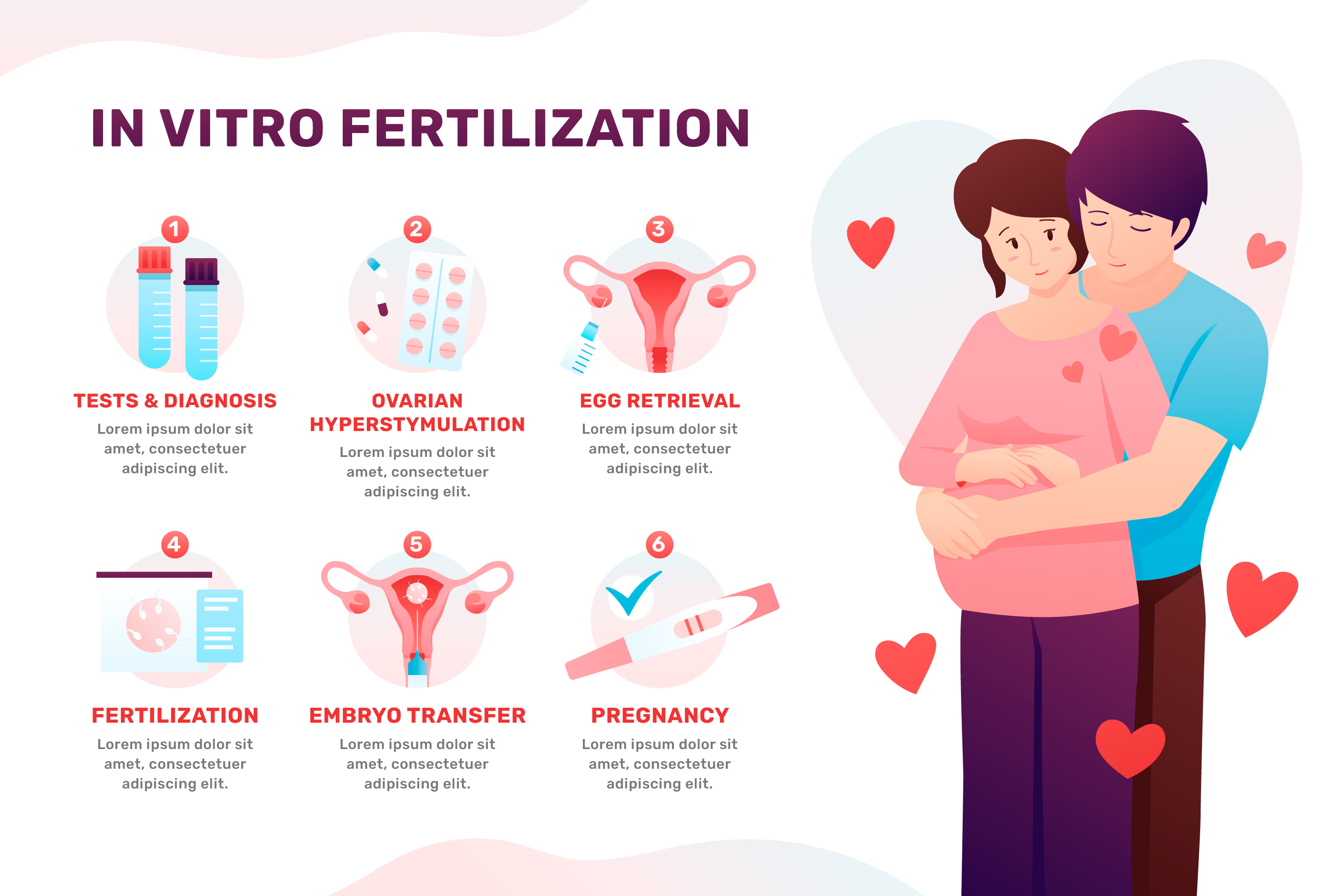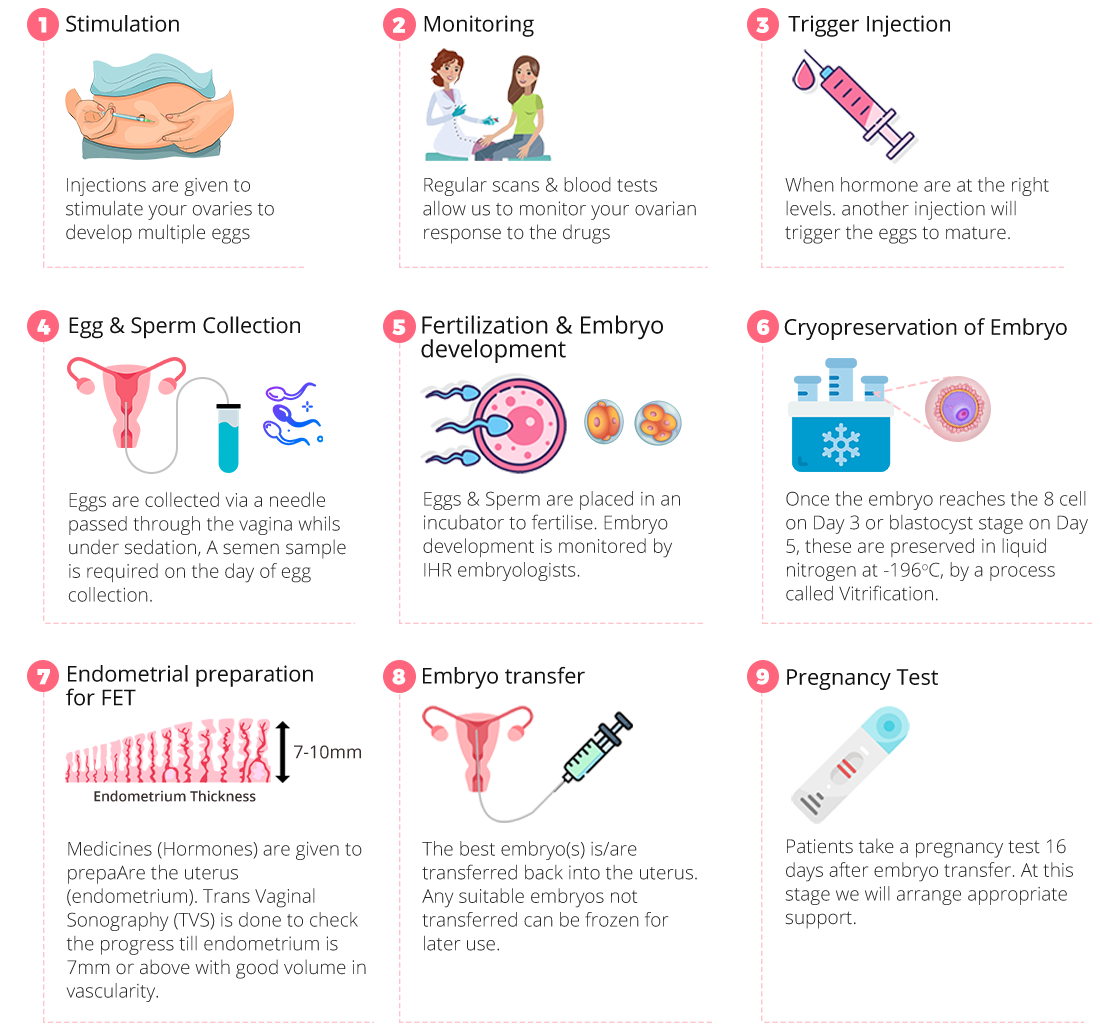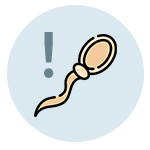What is IVF and How does it work?
IHR Kolkata, a well-respected fertility clinic in Kolkata, offers a wide range of fertility treatments including IVF treatment in Kolkata. In vitro fertilization (IVF), one of the world's premier assisted reproductive technologies, offers couples suffering from infertility an effective solution. In the IVF procedure, the eggs from the ovaries of the woman are taken and fertilized in a lab dish with sperm. The embryos that are created will then be transferred into the uterus of the woman in order to achieve a successful pregnancy. IHR Kolkata offers IVF treatments by highly experienced doctors and embryologists who collaborate to offer customized care and assistance to couples undergoing IVF in Kolkata. With the help of IVF, couples experiencing infertility have an opportunity to conceive and begin building their family.
IVF treatment in Kolkata involves multiple stages such as ovarian stimulator, egg retrieval and fertilization, culture of embryos, and transfer. Our fertility specialists closely monitor every step of the process to create a customized treatment plan to meet the needs of each patient and enhance their chances of success.

When is IVF Treatment Recommended?
IVF treatment should generally be considered by women under 43 who have tried for two years to conceive with unprotected sexual relations without success. These treatments can help treat infertility caused by blocked fallopian tubes, genetic issues or male infertility factors. In some cases, less invasive procedures such as fertility drugs or intrauterine insemination may be tried first. However, IVF treatment in Kolkata may be recommended to women in their mid-30s when other options have failed or when other health conditions such as fallopian tube damage, ovulation disorders, endometriosis, uterine fibroids, previous tubal sterilization or removal, impaired sperm function, unexplained infertility, genetic disorders, or for fertility preservation due to cancer or other health conditions. Therefore it is wise to discuss all available treatments with a fertility specialist prior to embarking upon IVF therapy treatment plan In Kolkata. It is important to discuss all available options with a fertility specialist to determine the best course of IVF treatment In Kolkata.
Why Choose IHR India For IVF treatment in Kolkata?
At IHR Kolkata, we offer the best IVF treatment in Kolkata, providing couples struggling with infertility the opportunity to achieve their dream of having a child. We use advanced medical technologies and modern infrastructure to offer personalized treatment plans tailored to the unique needs of each patient. Our team of experienced and caring medical staff works closely with patients at every step, providing support and guidance throughout their fertility journey. With a high success rate of 70%, we are a leading choice for both domestic and international patients that are seeking for IVF treatment in Kolkata. We are committed to making superior infertility treatments that are affordable and accessible to a larger population, helping more couples fulfill their dream of parenthood.
Our team of experts, fertility breakthrough results and a 70% success rate made us a unique option for desired couples. We are trying our best to make superior infertility treatments inexpensive to a larger population.
Reasons To Choose Us:
1. We are passionate about helping infertile couples with our definite solutions.
2. All our methods are well-tested and tried.
3. We always focus on reducing the mental and physical stress of our patient so that they go successfully in their IVF treatment.
4. Our medical staff is supportive and help you in every step of your IVF fertility journey.
5. We deliver supreme services for male and female infertility that results in better outcomes for both mothers and babies.

Who will benefit from IVF?
Women with both Fallopian tubes blocked, absent (due to surgery) or damaged due to disease.
Endometriosis i.e. the presence of endometrium (lining of the womb) outside the uterus.
The husband has a:
-
Reduced sperm count
(Oligozoospermia) -
Reduced motile sperm
(Asthenozoospermia ) -
Increased abnormal sperm
(Teratozoospermia)
Families who have a history of genetic disorder may be helped with IVF & Preimplantation Genetic Testing for Monogenic or Single Gene Defects / Preimplantation Genetic Testing for Chromosomal Structural Rearrangements. (PGT-M/SR).
Sperm antibodies in the wife's and or husband's serum.
Unexplained Infertility (refers to couples in whom no obvious pathology is found but who cannot conceive).
Man with Azoospermia (no sperm is seen in semen).
IVF also helps women who have absent ovaries or where there are no eggs in the ovaries (see Oocyte Donation).
Women who have failed conception with Ovulation Induction and IUI.
Women who suffer from repeated abortion. In these cases, IVF with Preimplantation Genetic Testing for Aneuploidies (PGT-A) may help.
IVF-FET Program (Step-by-Step):

IVF Program (Step-by-Step):
Ovarian stimulation is done by drugs like recombinant FSH, Pure FSH, or HMG. The injections are usually started on 2nd or 3rd of menstrual cycle. If necessary stimulation can be started at a later date while continuing the down regulation.
Monitoring the maturity of Eggs is done by periodic ultrasound examination of the ovaries. Patient has to report to the clinic every day from 2nd of menstrual cycle till the eggs are aspirated. This may require from 10 days to 15 days.

When follicles are mature HCG or GnRH-a is injected. This causes final maturation of the eggs. Eggs are collected 34- 35 hrs after this injection.
Eggs are retrieved transvaginally under the guidance of sonography.
Egg retrieval is usually done under Short General Anaesthesia. The process is done usually as OPD procedure and does not require overnight stay at the hospital.
Complications of the procedure occur in less than 1% of the cases. Some patients may experience vaginal spotting and mild lower abdominal pain. Rarely infection, haemorrhage, and lower bowel or bladder injury that may require additional surgery. Rarely if an attempt at the ultrasound retrieval is unsuccessful, a laparoscopic retrieval is performed.

After the retrieval, the husband is asked to provide semen sample. The eggs & sperms are placed together in the incubator (at a temperature i.e. 37 degrees centigrade and 5-6% CO2 atmosphere and 5% O2) (TRIPLE GAS INCUBATOR)
An extra semen sample is always collected at the beginning of IVF cycle. In case the husband is not able to attend clinic or provide the semen sample on the day of OPU, this sample works as a backup sample.
In cases of azoospermia the sperms are collected by putting a small needle in the testis. This is known as Testicular Sperm Aspiration (TESA). In these cases, or if the sperm count is very less fertilization is done with help of procedure called Intra Cytoplasmic Sperm Injection (ICSI)

Fertilization is the process of a sperm penetrating the egg. The egg being fertilized is now called an embryo. These are observed further to be certain that they are dividing (cleaving) normally.

There was a time when we used to transfer embryos back into uterus 2-3 days after ovum pickup (OPU), but as the science has advanced, it was realised that excessive hormone production during stimulation decreases chances of pregnancy and it is best not to do embryo
transfer in same cycle.
Therefore, since 2012 we cryopreserve most of our embryos and prefer to transfer in further cycles. This gives us pregnancy rates up to 60%
Once the embryo reaches the 8 cell on Day 3 or blastocyst stage on Day 5, these are preserved in liquid nitrogen at -196oC, by a process called Vitrification.

Lorem ipsum dolor sit amet, consectetuer adipiscing elit. Aenean commodo ligula eget dolor. Aenean massa. Cum sociis natoque penatibus et magnis dis parturient montes, nascetur ridiculus mus. Donec quam felis, ultricies nec, pellentesque eu, pretium quis, sem. Nulla consequat massa quis enim. Donec pede justo, fringilla vel, aliquet nec, vulputate eget, arcu. In enim justo, rhoncus ut, imperdiet a, venenatis vitae, justo. Nullam dictum felis eu pede mollis pretium. Integer tincidunt. Cras dapibus. Vivamus elementum semper nisi.

In the cycle, in which we decide to transfer, medicines are given to prepare uterus (Endometrium). Time to time hormones and TVS are done to check the progress. Once the endometrium is 7 mm or above, with good volume and vascularity, embryos are placed inside
the uterus under ultrasound guidance.
The procedure is done on an outpatient basis. The patient takes rest for 1 (one) hours at the centre and then, is allowed to go home.

Blood test is performed for confirmation of pregnancy approximately 10-12 days following embryo transfer.

Who Needs IVF Treatment?
Do you have difficulty conceiving a child? Couples who have failed to conceive using other methods often consider IVF treatment in Kolkata. Here are some reasons why couples consider IVF treatment:
1. Tubal Factor: When the fallopian tubes become blocked or damaged, IVF may be the only viable way to achieve pregnancy. Since the fallopian tubes connect ovaries to womb, and an egg cannot travel down them without impediments, pregnancy cannot occur naturally.
2. Male Infertility: It is a common reason for infertility in couples. If the male partner has low sperm count or abnormalities that hinder fertilization of the egg, IVF with ICSI is frequently recommended for a successful pregnancy and biological baby.
3. Age-related Infertility: As women age, their ovarian function decreases and they may find it increasingly difficult to get pregnant. Some women's ovarian function decreases earlier, making it necessary to consider IVF treatment sooner.
4. PCOS: Patients living with Polycystic Ovary Syndrome (PCOS) frequently have difficulty becoming pregnant. IVF treatment may be beneficial and help lower some risk factors.
5. Undetermined Infertility: Approximately 20% of couples experience unexplained infertility, without any identifiable reason. IVF treatment has proven to be successful in such cases.
6. Genetic Disease: Couples suffering from genetic disorders who experience repeated miscarriages should consider IVF treatment as the only option for a successful pregnancy.
The Success Rate Of IVF In Kolkata India As Follows
The success rate of IVF treatment in Kolkata is affected by the age and previous IVF experience of a woman. According to reports, the IVF success rate in Kolkata is increasing for all age groups. Women who undergo IVF for the very first time have a success rate of around 40% during the initial cycle. This rises to about 50% after the eighth cycle. After three IVF cycles, the probability of pregnancy rises to 65%.
Frequently Asked Questions
How long the couple has to stay in the institute?
This is purely an OPD procedural and the couple does not have to get admitted. The couple usually requires three visits to the institute.
-
In the first visit, preliminary investigations are done. The couple has to visit the institute for 2-3 days.
-
In the second visit, the wife has to visit the institute for 15 to 20 days. The wife has to report to the clinic on 2nd day of the menstrual cycle.
-
In the third visit wife has to come during the Embryo transfer. During this process, she has to visit the institute for about 7-10 days.
What are other risks of IVF procedure?
1. Chances of multiple pregnancies are about 20%.
2. Miscarriage rates in a patient undergoing IVF is similar to any infertile patient conceiving through other fertility treatment (10-15%).
3. There was a time when we used to talk about the risk of Ovarian Hyper Stimulation Syndrome (OHSS) but due to advancement in science, now our clinic is an OHSS FREE CLINIC since 2012.
Your IVF cycle may have to be cancelled before ovum pickup:
The aim of the intensive monitoring of the IVF cycle is to obtain a good number of healthy mature eggs. If the cycle is unsatisfactory, it may have to be cancelled at any stage.
The reasons for cancellation are:
-
Too few follicles are developing which would decrease the chances of obtaining at least one mature egg.
-
There are no follicles developing at all. This is rare but may occur.
How many times IVF can be repeated?
IVF can be repeated as many times as a couple can afford.
Up to what age IVF is possible?
IVF is preferable up to the age of 35 years (wife). It may be extended up to the age of 38 years (to be done only after ovarian reserve tests, which are done before your IVF cycle). After the age of 38 years, females are usually unable to produce good quality eggs. In these cases, pregnancy can be achieved by using donor eggs. IVF by Donor Eggs can be done up to the age of 52 years provided the wife is physically and mentally fit. Pregnancy in postmenopausal women can be achieved by IVF using donor eggs.

.png) (+91) 9142061420
(+91) 9142061420
















